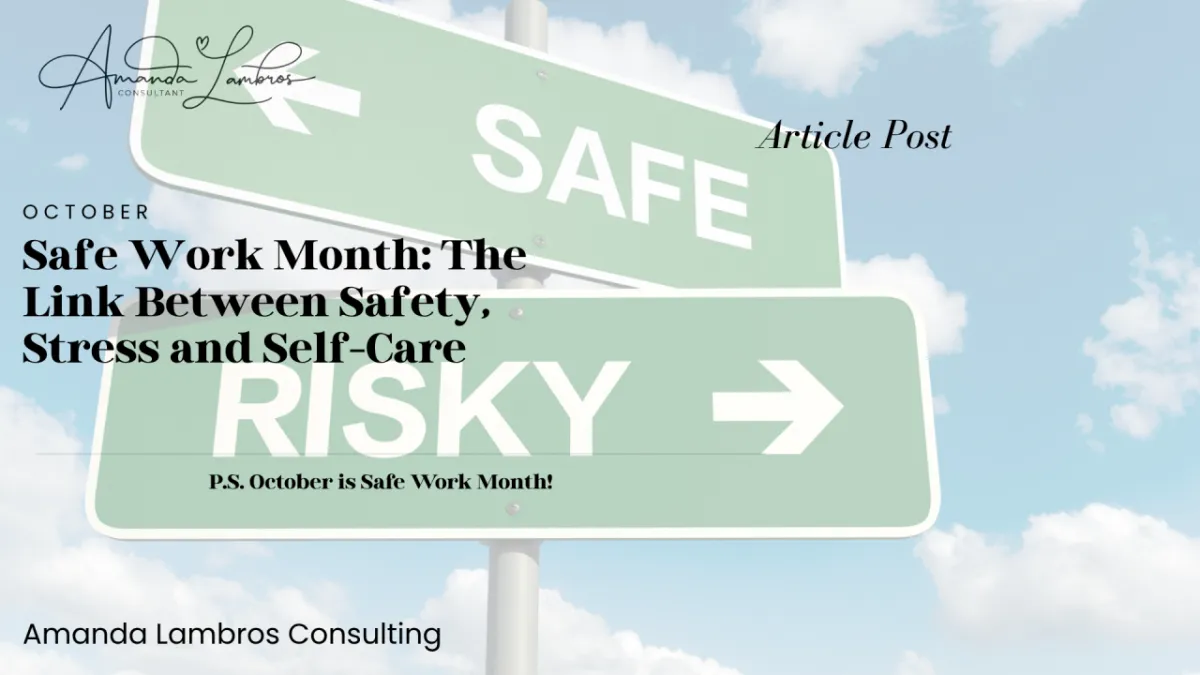
Safe Work Month: The Link Between Safety, Stress and Self-Care
October marks National Safe Work Month in Australia. A reminder that safety isn’t just about physical hazards, but also about the mental and emotional wellbeing of every person at work.
When most people hear “workplace safety,” they picture helmets, hi-vis gear, or risk assessments. Those are important, but they’re only half the story. Safety also means protecting people from the less visible hazards, chronic stress, burnout, poor mental health, and toxic cultures.
These invisible risks can be just as damaging as a trip hazard or faulty equipment, and they demand just as much attention.
Stress is a Workplace Hazard
Work-related stress is now one of the most significant challenges for organisations. High workloads, constant change, unclear expectations, or unsupportive leadership can leave employees feeling overwhelmed. Over time, this stress becomes more than “just part of the job.” It becomes a health and safety risk.
When unmanaged, stress doesn’t only reduce morale, it affects performance and safety. Stressed employees are more likely to make mistakes, suffer from fatigue, and develop long-term health issues. In fact, Safe Work Australia notes that psychological injury claims are increasing faster than any other type of workplace claim.
If we want truly safe workplaces, we can’t afford to treat stress as an afterthought.
Why Self-Care Matters
This is where self-care comes in. Too often it’s seen as indulgent, or something to do outside of work hours. In reality, self-care is the foundation of safe work.
Boundaries: Knowing when to log off, when to say no, and when to protect personal time.
Recovery: Prioritising sleep, rest, and practices that restore energy.
Connection: Spending time with people who support and encourage us.
Movement: Recognising the mental and physical benefits of staying active.
When workers take care of themselves, they’re better equipped to handle the pressures of their roles. And when organisations encourage and model self-care, they reduce risks of burnout and absenteeism. A burnt-out worker is not a safe worker, for themselves, their colleagues, or the organisation.
Equipping Teams with Tools
One of the most effective steps workplaces can take is to integrate Mental Health First Aid (MHFA) training.
Just as we train staff to respond to physical injuries, MHFA equips people to:
Recognise signs of stress, anxiety, burnout, or crisis.
Respond with confidence and compassion in the moment.
Connect colleagues with appropriate professional help and ongoing support.
This kind of training changes workplace culture. It fosters an environment where employees look out for one another and reduces stigma around mental health conversations. Importantly, it helps leaders demonstrate that mental health is not a “nice to have”, it’s a core part of workplace safety.
Leadership and Safe Work Culture
Leaders play a crucial role in shaping what “safe work” means. It’s not enough to focus on compliance. True safety goes beyond checklists to create cultures of trust, openness, and care.
When leaders encourage mental health conversations, model boundaries, and support staff in accessing resources, they send a powerful message: you matter, and your wellbeing matters.
This is what retains staff, reduces turnover, and builds resilience.
As we mark Safe Work Month, it’s worth asking a few key questions: Are your workplace systems protecting both physical and psychological health? Are your teams equipped to recognise and respond to mental health concerns? And are you, personally, taking care of your own wellbeing as much as you care for those around you?
Because a safe workplace isn’t only one free from physical harm. It’s a place where people can thrive, connect, and bring their best selves to work.
This October, let’s commit to making self-care, mental health, and compassion central to what “safe work” really means.


